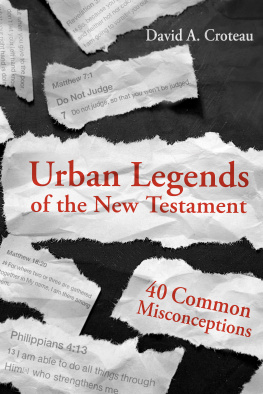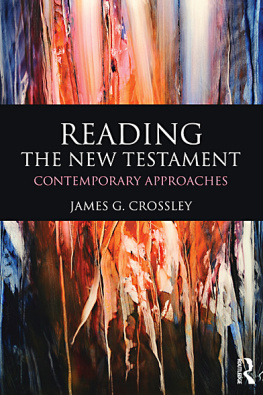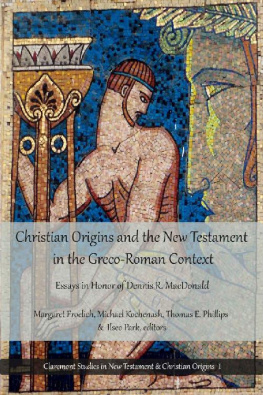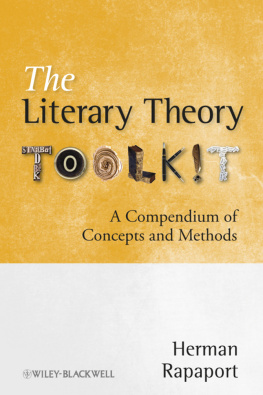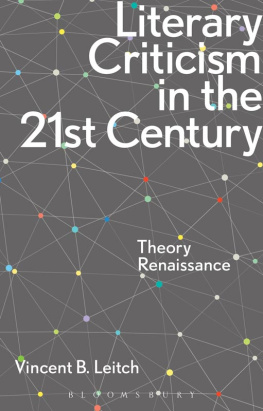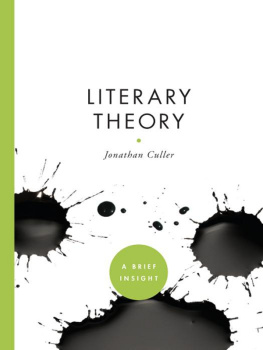Literary Theory and the New Testament
THE ANCHOR YALE BIBLE REFERENCE LIBRARY is a project of international and interfaith scope in which Protestant, Catholic, and Jewish scholars from many countries contribute individual volumes. The project is not sponsored by any ecclesiastical organization and is not intended to reflect any particular theological doctrine.
The series is committed to producing volumes in the tradition established half a century ago by the founders of the Anchor Bible, William Foxwell Albright and David Noel Freedman. It aims to present the best contemporary scholarship in a way that is accessible not only to scholars but also to the educated nonspecialist. It is committed to work of sound philological and historical scholarship, supplemented by insight from modern methods, such as sociological and literary criticism.
John J. Collins
General Editor
THE ANCHOR YALE BIBLE REFERENCE LIBRARY
Literary Theory and the New Testament
MICHAL BETH DINKLER
Yale UNIVERSITY PRESS
NEW HAVEN AND LONDON
Anchor Yale Bible and the Anchor Yale logo are registered trademarks of Yale University.
Copyright 2019 by Yale University.
All rights reserved.
This book may not be reproduced, in whole or in part, including illustrations, in any form (beyond that copying permitted by Sections 107 and 108 of the U.S. Copyright Law and except by reviewers for the public press), without written permission from the publishers.
Yale University Press books may be purchased in quantity for educational, business, or promotional use. For information, please e-mail (U.K. office).
Set in Adobe Caslon and Bauer Bodoni type by Newgen North America.
Printed in the United States of America.
Library of Congress Control Number: 2019937180
ISBN 978-0-300-21991-3 (hardcover : alk. paper)
A catalogue record for this book is available from the British Library.
This paper meets the requirements of ANSI/NISO Z39.48-1992 (Permanence of Paper).
10 9 8 7 6 5 4 3 2 1
Contents
Acknowledgments
The lone writer is one of the most resilient and long-standing literary tropes. Im sure you can picture it: the writer writes, alone in a bare room and barely aware of passersby. Still, no book is born straight from the mind of one solitary scribbler. This book certainly wasnt.
This book arose out of a montage of moments, most of which I could never have anticipated or orchestrated, and many of which blend together in my memory. Literary Theory and the New Testament exists because my family nurtured in me a lifelong love for narrative and a deep thirst for the intellectual life; because mentors like Franois Bovon and John Darr encourage(d) me to draw on my training in literary theory when interpreting the New Testament and gave invaluable feedback in my earliest attempts to do so; because my New Testament colleagues at Yale Divinity SchoolHarry Attridge, Adela Collins, JanJan Lin, Judy Gundry, and Dean Gregory Sterlinghave shown unfailing good cheer and consistent interest in my work. This book is the direct result of countless interactions with others: a long conversation with Scott Elliott, feedback from good friends and top-notch Lukan scholars Brittany Wilson and Daniel Lynwood Smith, generative dialogue with my deeply engaged students at Yale (notably, the 2014 Literary Criticism and the NT seminar), and Timothy Gannetts and Zachary Smiths remarkably thorough research assistance.
Certain parts of the book began as conference papers and thus benefited from ensuing discussions with colleagues at the Annual Meeting of the Studiorum Novi Testamenti Societas at the University of Pretoria (2017); the Verstehen und Interpretieren: Zum Basisvokabular von Hermeneutik und Interpretationstheorie Conference at the University of Zurich (2016); the Society of Biblical Literatures Gospel of Luke and Book of Acts units session on characterization at the 2016 annual meeting; the The Fact of Value? Normativity in the Humanities Conference at Yale University (2016); the Jesus, quo vadis? Entwicklungen und Perspektiven der aktuellen Jesusforschung Symposion at Johannes Gutenberg University (2016); and the Columbia Seminar for the Study of the New Testament at Columbia University (2016 and 2019).
You quite literally would not be reading this were it not for John Collins, who championed the project from the start; Zachary Smith, who devoted countless hours both to meticulous research and to formatting; or Heather Gold and the rest of the Yale University Press editorial team, who so ably assisted in the production of the manuscript. I am grateful, too, for Dean Gregory Sterlings generous support and a yearlong research leave funded by Yale University.
If Literary Theory and the New Testament does what it is meant to do, it will be in large part because Stephen Moore, Jerry Camery-Hoggatt, and an anonymous reviewer read the entire manuscript, offering incisive questions and wise suggestions. Adele Reinhartz, who read the whole book more than once, was a particularly thoughtful and judicious editor. My thinking about the literariness of the New Testament has been ineluctably shaped by the scholarship of Moore, Camery-Hoggatt, and Reinhartz; that they would engage with my work so rigorously and charitably continues to humble and astonish me.
A writers thoughts will never become a book without the generosity and effort of so many others. And yet, the trope of the solitary writer is a trope for a reason. The greatest gift a writer can ask for, ultimately, is a room of her own to write. I dedicate this book to John, Alethea, and Daelen, with deep gratitude for giving me that gift, time and again, when they would rather have had their wife and mama off the computer, out of her head, and fully in the mix, and to my fiercely brilliant sister, Brynn, whosince the day she was bornhas been reminding me that even when Im alone in a room of my own, Im never truly alone.
Introduction
A large tanker sits off Authors Point in the bay of Biblical Studies.... Her decks remain crowded with those who energetically cast their lines out into the water, fishing for meaning.... Yet this tanker, once master of the bay, is no longer the sole craft upon the waters.
George Guthrie
So begins George Guthries brief but entertaining allegorical account of biblical scholarships uses of various literary criticisms and linguistics. Boats of interpreters move about the bay, seeking the fish of meaningcasting their lines off the coast of Authors Point, in or below the Tides of the Text, or from various Reader Reefs. The proliferation of publications in New Testament (NT) studies that refer to literary criticisms and linguistics has given rise to a massive and unwieldy body of scholarly literature. The bay has gotten crowded, Guthrie concludes, and we must ask what we are to do about it.
Before we get to the question of what we are to do about it, I propose that we extend Guthries act of imagination. What if, in addition to a Bay of Biblical Studies, we picture a Lake of Literary Studies where boats of literary critics are also fishing for meaning using various literary criticisms and linguistics, just in different (non-biblical) corpora? Literary criticism concerns the techniques and strategies employed by specific literary works and the responses they evokethe approaches, that is, that various critics take when interpreting a text. One way to organize this book, then, might be to describe how NT scholars have invited literary critics to serve as navigators as they search for good spots to fish in sometimes turbulent interpretive currents. How, for example, have biblical scholars appropriated postcolonial literary criticism in Gospel interpretation? How have biblical scholars applied the interpretive techniques theyve learned from feminist literary critics to the Pauline corpus, or to Johannine literature?
Next page

